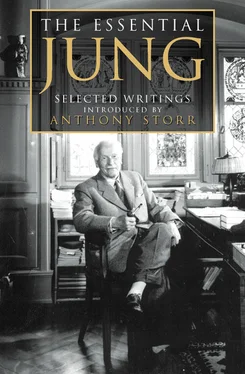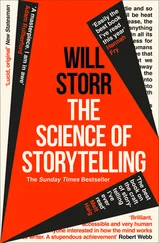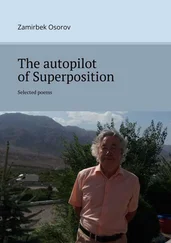* As the author subsequently learned, the 1910 edition was actually the second, there having been a first edition in 1903.
* Robert Mayer, Kleinere Schriften und Briefe (Stuttgart, 1893), p. 213 (letter to Wilhelm Griesinger, June 16, 1844).
† G. F. Helm, Die Energetik nach ihrer geschichtlichen Entwicklung (Leipzig, 1898), p. 20.
** Generally called mana .
* Freud speaks of “archaic vestiges.”
* 1957.
† 27th November, 1955.
Part 4. Archetypes: Shadow; Anima; Animus; the Persona; the Old Wise Man
In Jung’s dream about Siegfried (quoted in Part 3), it will be recalled that he was accompanied by a “small, brown-skinned savage” who initiated the killing. This figure, Jung affirms, “was an embodiment of the primitive shadow.”
By shadow I mean the “negative” side of the personality, the sum of all those unpleasant qualities we like to hide, together with the insufficiently developed functions and the contents of the personal unconscious. [CW7, par. 103n]
The shadow is one example of an “unconscious personality” which possesses a certain measure of autonomy. The shadow might be said to be responsible for those slips of the tongue and other “mistakes” which Freud catalogues in The Psychopathology of Everyday Life; mistakes which reveal feelings and motives which the conscious self disowns. The shadow is also often projected on to others. Examination of those attributes which a man most condemns in other people (greed, intolerance, disregard for others etc.) usually shows that, unacknowledged, he himself possesses them.
The shadow is usually the first archetype to be encountered during analysis. In the dreams of Europeans, the shadow appears as a figure of the same sex as the dreamer; usually as dark-skinned, alien or primitive, as in Jung’s own dream. Jung makes the point that making conscious the repressed tendencies and confessing the less desirable aspects of personality which the shadow portrays does not rid us of them.
From Psychology and Religion, CW 11, pars. 130–4
If one discounts the “statistical criminal,” there still remains the vast domain of inferior qualities and primitive tendencies which belong to the psychic structure of the man who is less ideal and more primitive than we should like to be. We have certain ideas as to how a civilized or educated or moral being should live, and we occasionally do our best to fulfil these ambitious expectations. But since nature has not bestowed the same blessings upon each of her children, some are more and others less gifted. Thus there are people who can just afford to live properly and respectably; that is to say, no manifest flaw is discoverable. They either commit minor sins, if they sin at all, or their sins are concealed from them by a thick layer of unconciousness. One is rather inclined to be lenient with sinners who are unconscious of their sins. But nature is not at all lenient with unconscious sinners. She punishes them just as severely as if they had committed a conscious offence. Thus we find, as the pious Henry Drummond * once observed, that it is highly moral people, unaware of their other side, who develop particularly hellish moods which make them insupportable to their relatives. The odour of sanctity may be far reaching, but to live with a saint might well cause an inferiority complex or even a wild outburst of immorality in individuals less morally gifted. Morality seems to be a gift like intelligence. You cannot pump it into a system to which it is not indigenous.
Unfortunately there can be no doubt that man is, on the whole, less good than he imagines himself or wants to be. Everyone carries a shadow, and the less it is embodied in the individual’s conscious life, the blacker and denser it is. If an inferiority is conscious, one always has a chance to correct it. Furthermore, it is constantly in contact with other interests, so that it is continually subjected to modifications. But if it is repressed and isolated from consciousness, it never gets corrected, and is liable to burst forth suddenly in a moment of unawareness. At all events, it forms an unconscious snag, blocking the most well-meant attempts.
We carry our past with us, to wit, the primitive and inferior man with his desires and emotions, and it is only with an enormous effort that we can detach ourselves from this burden. If it comes to a neurosis, we invariably have to deal with a considerably intensified shadow. And if such a person wants to be cured it is necessary to find a way in which his conscious personality and his shadow can live together.
This is a very serious problem for all those who are themselves in such a predicament or have to help sick people back to normal life. Mere suppression of the shadow is as little of a remedy as beheading would be for headache. To destroy a man’s morality does not help either, because it would kill his better self, without which even the shadow makes no sense. The reconciliation of these opposites is a major problem, and even in antiquity it bothered certain minds. Thus we know of an otherwise legendary personality of the second century, Carpocrates, a Neoplatonist philosopher whose school, according to Irenaeus, taught that good and evil are merely human opinions and that the soul, before its departure from the body, must pass through the whole gamut of human experience to the very end if it is not to fall back into the prison of the body. It is as if the soul could only ransom itself from imprisonment in the somatic world of the demiurge by complete fulfilment of all life’s demands. The bodily existence in which we find ourselves is a kind of hostile brother whose conditions must first be known. It was in this sense that the Carpocratians interpreted Matthew 5:25f. (also Luke 12:58f.): “Agree with thine adversary quickly, whiles thou art in the way with him; lest at any time the adversary deliver thee to the judge, and the judge deliver thee to the officer, and thou be cast into prison. Verily I say unto thee, Thou shalt by no means come out thence, till thou hast paid the uttermost farthing.” Remembering the other Gnostic doctrine that no man can be redeemed from a sin he has not committed, we are here confronted with a problem of the very greatest importance, obscured though it is by the Christian abhorrence of anything Gnostic. Inasmuch as the somatic man, the “adversary,” is none other than “the other in me,” it is plain that the Carpocratian mode of thought would lead to the following interpretation of Matthew 5:22f.: “But I say unto you, That whosoever is angry with himself without a cause shall be in danger of the judgment: and whosoever shall say to himself, Raca, shall be in danger of the council: but whosoever shall say, Thou fool, shall be in danger of hell fire. Therefore if thou bring thy gift to the altar, and there rememberest that thou hast aught against thyself, leave there thy gift before the altar, and go thy way; first be reconciled to thyself, and then come and offer thy gift. Agree with thyself quickly, whiles thou art in the way with thyself, lest at any time thou deliverest thyself to the judge.” From here it is but a step to the uncanonical saying: “Man, if indeed thou knowest what thou doest, thou art blessed; but if thou knowest not, thou art cursed, and a transgressor of the law.” But the problem comes very close indeed in the parable of the unjust steward, which is a stumbling-block in more senses than one. “And the lord commended the unjust steward, because he had done wisely” (Luke 16:8). In the Vulgate the word for “wisely” is prudenter, and in the Greek text it is  (prudently, sensibly, intelligently). There’s no denying that practical intelligence functions here as a court of ethical decision. Perhaps, despite Irenaeus, we may credit the Carpocratians with this much insight, and allow that they too, like the unjust steward, were commendably aware of how to save face. It is natural that the more robust mentality of the Church Fathers could not appreciate the delicacy and the merit of this subtle and, from a modern point of view, immensely practical argument. It was also dangerous, and it is still the most vital and yet the most ticklish ethical problem of a civilization that has forgotten why man’s life should be sacrificial, that is, offered up to an idea greater than himself. Man can live the most amazing things if they make sense to him. But the difficulty is to create that sense. It must be a conviction, naturally; but you find that the most convincing things man can invent are cheap and ready-made, and are never able to convince him against his personal desires and fears.
(prudently, sensibly, intelligently). There’s no denying that practical intelligence functions here as a court of ethical decision. Perhaps, despite Irenaeus, we may credit the Carpocratians with this much insight, and allow that they too, like the unjust steward, were commendably aware of how to save face. It is natural that the more robust mentality of the Church Fathers could not appreciate the delicacy and the merit of this subtle and, from a modern point of view, immensely practical argument. It was also dangerous, and it is still the most vital and yet the most ticklish ethical problem of a civilization that has forgotten why man’s life should be sacrificial, that is, offered up to an idea greater than himself. Man can live the most amazing things if they make sense to him. But the difficulty is to create that sense. It must be a conviction, naturally; but you find that the most convincing things man can invent are cheap and ready-made, and are never able to convince him against his personal desires and fears.
Читать дальше

 (prudently, sensibly, intelligently). There’s no denying that practical intelligence functions here as a court of ethical decision. Perhaps, despite Irenaeus, we may credit the Carpocratians with this much insight, and allow that they too, like the unjust steward, were commendably aware of how to save face. It is natural that the more robust mentality of the Church Fathers could not appreciate the delicacy and the merit of this subtle and, from a modern point of view, immensely practical argument. It was also dangerous, and it is still the most vital and yet the most ticklish ethical problem of a civilization that has forgotten why man’s life should be sacrificial, that is, offered up to an idea greater than himself. Man can live the most amazing things if they make sense to him. But the difficulty is to create that sense. It must be a conviction, naturally; but you find that the most convincing things man can invent are cheap and ready-made, and are never able to convince him against his personal desires and fears.
(prudently, sensibly, intelligently). There’s no denying that practical intelligence functions here as a court of ethical decision. Perhaps, despite Irenaeus, we may credit the Carpocratians with this much insight, and allow that they too, like the unjust steward, were commendably aware of how to save face. It is natural that the more robust mentality of the Church Fathers could not appreciate the delicacy and the merit of this subtle and, from a modern point of view, immensely practical argument. It was also dangerous, and it is still the most vital and yet the most ticklish ethical problem of a civilization that has forgotten why man’s life should be sacrificial, that is, offered up to an idea greater than himself. Man can live the most amazing things if they make sense to him. But the difficulty is to create that sense. It must be a conviction, naturally; but you find that the most convincing things man can invent are cheap and ready-made, and are never able to convince him against his personal desires and fears.










